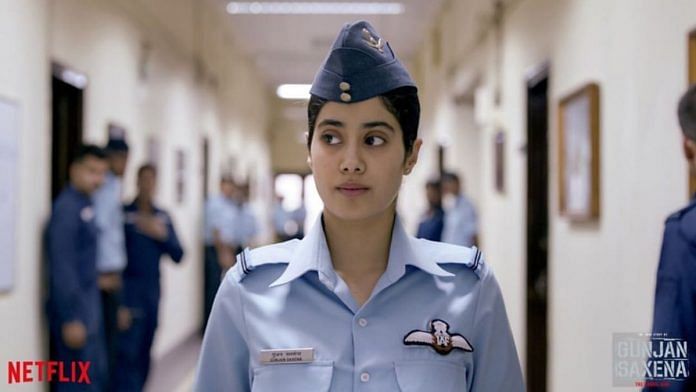New Delhi: The controversy over Netflix’s Gunjan Saxena: The Kargil Girl has refused to die down. Produced by Karan Johar’s Dharma Productions, the movie irked the Indian Air Force (IAF) by taking liberties with certain historical elements while narrating the story of a woman pilot who was part of the 1999 Kargil war.
For one, it projects the retired officer as the first woman helicopter pilot of the IAF, which is absolutely false. The movie also shows her as the only women pilot of her era, which is also not true.
For this week’s Your Turn, we asked readers: Can filmmakers take liberties with history under the guise of creative licence?
Here’s what some of them said.
‘Films aren’t obliged to tell the truth, can’t outlaw creative license’
Films don’t have an obligation to tell the truth, they have an obligation to entertain. The audience knows that filmmakers show not what happened but the aspects that appeal to the box office. Most movies based on true stories make no claim to being completely factual.
We may disagree with films that take liberties with the truth but the way to stop the making of such movies in a society that values free expression is not to ban them but rather for individuals to stop watching them.
If we outlaw creative license today, what stops us from outlawing creativity tomorrow?
 Anoushka Kothari, Mumbai. Twitter handle: @anoushka1503
Anoushka Kothari, Mumbai. Twitter handle: @anoushka1503
‘Filmmakers owe it to audience, their subjects to stick to the book’
We live in polarised times in a country where people take great pride in their history and use it to justify present actions. In a situation like this, history is a precious tool which can be used for good and evil, especially history presented in an accessible and widespread form that is film. Given the film’s influence and the times we’re living in, how does one differentiate between creative liberties and propaganda?
In an ideal world, everyone would know history perfectly and wouldn’t internalise these liberties but appreciate them for what they are — fabrications, but right now, filmmakers owe it to their audiences and to the groups they are misrepresenting to stick to the book.
— Aditi, Kanpur. Twitter handle: @a_deity_03.
‘Filmmakers can change facts, but should let audience know’
Yes, filmmakers can take liberties to dramatise or make a scene more creative.
But if they are changing the facts, they need to probably share a message at the time of the scene stating that the story/facts have been altered for entertainment purposes.
 Rachit Garg, Bengaluru. Twitter handle: @rachit_g2
Rachit Garg, Bengaluru. Twitter handle: @rachit_g2
‘Creative license is fine, but not for biopics’
My opinion on this is nuanced and depends heavily on context. In case of epics like Mughal-e-Azam, Tanhaji, Padmaavat etc, having a creative license is warranted, as they educate the masses about our heritage. In fact, all our knowledge about Chanakya comes from the Mudrarakshasa, a play written centuries after his death. It is also valid in movies which use historical events as a setting, to give insight, a feeling of patriotism, i.e, Lakshya, Lagaan. However, biopics or retellings that need to ensure that they don’t malign the parties involved. Some do this well (Dangal), while some do it poorly (Gunjan Saxena).
— Aaditya Govind Rao, Lucknow. Twitter handle: @aaditya_2001.
‘What is shown in movies lives with people for decades’
I vividly remember watching Kavita Chaudhary’s Udaan with my family when I was a kid. My sister and I always used to say, “Kalyani Singh ko dekha hai, ladkiya kuch bhi kar sakti hai.” We did not understand feminism and gender discrimination back then. But we understood what Kalyani Singh achieved in the TV show and we wanted to be like her.
Today, I know the history of World War II much better than the history of battle of Panipat solely because enough quality media content is available and my knowledge isn’t limited to the books I read in school.
That’s the power that filmmakers hold over common masses. They can educate people, inspire people, and teach things that we can’t learn from more conventional ways of learning. What is shown in movies lives with people for decades, contrary to news headlines that have a much shorter life span.
This puts a great responsibility on the shoulder of filmmakers which they wilfully neglect when they show any irresponsible content, be it factually incorrect content or violence inciting dialogues, or the lead actor endorsing improper behaviour.
— Himakshi Gupta. Twitter handle: @Himakshi_Gupta.
‘Millennials, Gen Z don’t go to the library, but watch series/movies, filmmakers shouldn’t meddle with facts’
It entirely depends on the kind of tweaks that are being made in the story. Any alteration of facts or drastic changes that meddle with the reality is wrong. Millenials and Gen Z are already not aware of the history of the nation and their primary method of absorbing content is through watching movies, series or documentaries and not reading books in the library.
So it is very important to decide how credible and real the content is that we are offering them. Under the guise of creative license, filmmakers can make changes in costumes, add animation effects to make it more appealing to the eye or add/remove a few bits which don’t really harm the story in any way. But meddling with facts, locations, names … that should not happen.
 Shivani Relia, New Delhi. Twitter handle: @ relia_shivani
Shivani Relia, New Delhi. Twitter handle: @ relia_shivani
‘There’s a Lakshman rekha for creative licence that filmmakers shouldn’t cross’
Often, it is difficult to arrive at one conclusion as there are several versions of history. Certain amount of creative liberty needs to be extended to the filmmaker. However, twisting of facts and distorting real history and sensationalising it for monetary benefit, or any other benefit, without prior intimation to the audience, is something I don’t endorse.
There is an imaginary line that a filmmaker should mentally draw. His poetic liberty can only go this far and no further. The imaginary line of ethics and propriety should be a ‘Lakshman rekha.’ Censor Board must ensure that the creative liberties are not misused.
 Sandeep Wanchoo, Gurgaon. Twitter handle: @swanchoo.
Sandeep Wanchoo, Gurgaon. Twitter handle: @swanchoo.
‘Film doesn’t have to be historically accurate’
A filmmaker has a unique opportunity to tell a story in amounts of details which a journalist doesn’t have the liberty to. A filmmaker tells a story in the most interesting way … A film doesn’t have to be historically accurate, if it is not claiming to be. If a story teller makes an active attempt to film a biography, it’s the responsibility of the story teller to stick to the facts. A film can either be fiction or can have a fictionalised version of the truth, which is still fiction.
— Dr Swanit Deshpande. Twitter handle: @swanitdeshpande
‘Censor board should keep check on films sensationalising distorted facts for money’
Certain amounts of creative liberty need to be extended to filmmakers to express their unique perspectives and engage their audience. Since history itself has several versions across different writers, not only in current times but also in the historical times, a bit of a creative touch won’t hurt so long as filmmakers do not deviate from real history altogether.
However, distorting real history and sensationalising it for monetary benefits or just for the sake of entertainment must be taken care of by the Censor Board, which certifies each film. It is here that the misuse of creative liberties can be kept under check.
 Soumini Pyne, Kolkata. Twitter handle: @SouminiPyne
Soumini Pyne, Kolkata. Twitter handle: @SouminiPyne
‘No rule book that says films must be historically accurate, there are documentaries for that’
A fictional film is a medium of storytelling where a filmmaker transforms an idea born in his brain into a visual spectacle. In no rulebook of ours or any other country is it written that filmmakers have to abide by the historical accuracies of a certain event if that event is being used as a backdrop for a film. There is a whole different section of movies called documentaries that fulfil that purpose. And if we take a look across the various film industries in different countries, we can see alternate history as a popular genre for filmmakers.
 Ambarish Awale, Amravati, Maharashtra. @ambarishawale
Ambarish Awale, Amravati, Maharashtra. @ambarishawale

